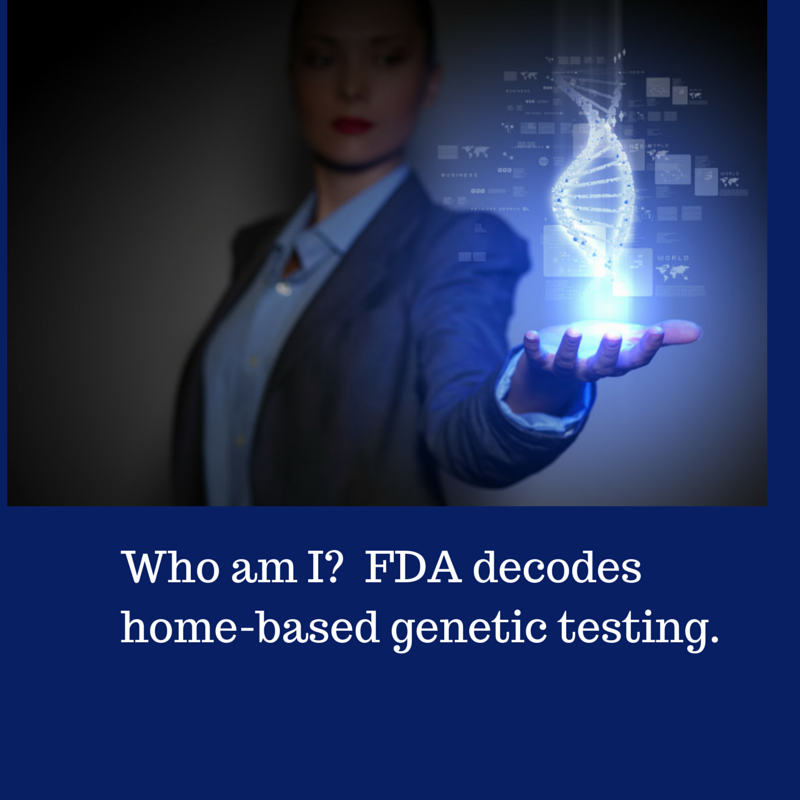FDA approved marketing for 23and Me’s Bloom Syndrome Carrier test, months after halting the company’s marketing of direct-to-consumer genetic tests. FDA now classifies genetic carrier screening tests as Class 2 medical devices but intends to exempt these devices from premarket review. (This decision is still subject to public comment).
Reasons for FDA Giving 23andMe the Green Light
FDA’s green light appears to represent a shift in position from the earlier decision to halt 23andMe. The new and more favorable position is based on FDA understanding of the value to consumers of the genetic screening technology, as well as testing done by 23andMe to alleviate FDA concerns about its the 23andMe Saliva Collection Kit and Personal Genome Service (PGS).
As to why FDA is more understanding of the value of home-based genetic testing, FDA stated in its press release authorizing the Bloom Syndrome Carrier Test:
“The FDA believes that in many circumstances it is not necessary for consumers to go through a licensed practitioner to have direct access to their personal genetic information. Today’s authorization and accompanying classification, along with FDA’s intent to exempt these devices from FDA premarket review, supports innovation and will ultimately benefit consumers,” said Alberto Gutierrez, Ph.D., director of the Office of In Vitro Diagnostics and Radiological Health in the FDA’s Center for Devices and Radiological Health. “These tests have the potential to provide people with information about possible mutations in their genes that could be passed on to their children.” ….
Like other home-use tests for medical purposes, the FDA requires the results to be conveyed in a way that consumers can understand and use. This is the same approach the FDA has taken with other over-the-counter consumer products such as pregnancy, cholesterol and HIV tests for home use.
While the FDA is not limiting who should or should not use these tests, it is requiring that the company explain to the consumer in the product labeling what the results might mean for prospective parents interested in seeing if they carry a genetic disorder.
If sold over the counter, the FDA is also requiring 23andMe to provide information to consumers about how to obtain access to a board-certified clinical molecular geneticist or equivalent to assist in pre- and post-test counseling.
The testing that 23andMe performed also made a difference:
- 23andMe performed two separate studies to demonstrate that their test is accurate in detecting Bloom syndrome carrier status.
- The company also conducted a usability study with 302 people not familiar with the 23andMe saliva collection device to demonstrate consumers could understand the test instructions and collect an adequate saliva sample.
- Finally, the company conducted a user study comprised of 667 randomly recruited participants representing the U.S. general population in age, gender, race and education level to show the test instructions and results were easy to follow and understand.
Note that 23andMe did not find a predicate device and show substantial equivalence in a 510k. Rather, the company used performance testing and other studies to show that consumers would be not be misled to misuse the test results. This is something it had not done the first go-around with FDA.
FDA’s Prior Position Reflected Concern about Consumers Being Misled
FDA’s earlier warning letter had directed 23 and Me to stop marketing its genetic tests because of failure to obtain marketing clearance or approval to assure their tests were accurate, reliable and clinically meaningful.
FDA had concluded that the intended use of the genetic tests made them “medical devices” under federal law.
Specifically, FDA noted, the tests were being marketed as providing “health reports on 254 diseases and conditions,” including categories such as “carrier status,” “health risks,” and “drug response,” and as a “first step in prevention” that enables users to “take steps toward mitigating serious diseases” such as diabetes, coronary heart disease, and breast cancer.
FDA had concluded: “Most of the intended uses for PGS listed on your website, a list that has grown over time, are medical device uses.”
23andMe’s Response to the New Authorization
Anne Wojcicki, CEO, heralded FDA’s authorization as an “important first step in fulfilling our commitment to return genetic health reports to consumers in the US” – one that creates “a regulatory framework for future submissions.”
This is a positive spin on what had been a setback – but then again, it’s a new technology and FDA’s first response was cautious and protective.
Conclusion
In one sense, this is indeed a breakthrough not only for 23andMe and home-based genetic testing, but also in terms of FDA modifying its traditional paternalistic stance and embracing more consumer-driven, participatory medicine.

Contact our healthcare law and FDA attorneys for legal advice relevant to your healthcare venture.
Contact Us


